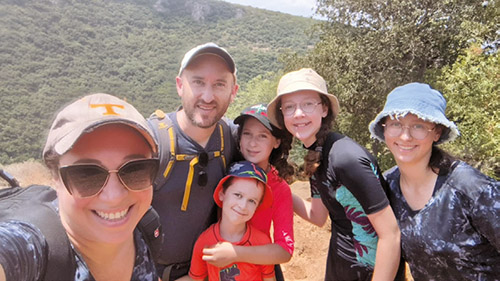

It was March 2020. Flights were grounded, schools were closing and Zoom sessions were replacing in-person encounters. While a large part of the planet was transitioning into lockdown, Rochelle Schnurr was heading into overdrive. An emergency room nurse in Jerusalem’s Shaare Zedek Hospital, she was used to dealing with disasters. But no one was prepared for COVID-19.
A native of New Haven, Connecticut, Schnurr began working as a criminologist with the Israeli Police Force shortly after making aliyah. It was a stay at the hospital back in 2007 when her older daughter fell sick that opened her eyes to the world of nursing, and the incredible impact that one individual can have on another during the most challenging of times. Schnurr decided that she wanted to be that person who would lift the spirits of sick individuals and assure their loved ones that “everything would be OK.” She left behind her career as a criminologist to become a full-time ER nurse at Shaare Zedek.
The ER in Shaare Zedek is a Level 1 trauma center that deals with everything from mass casualties to terror attacks to construction accidents. The hospital treats over 160,000 emergency cases annually and is advancing research on par with some of the world’s leading institutions. But when COVID-19 struck, there was so little information available, and medical professionals were left to improvise. This also meant overcompensating for the overcrowding and understaffing that is unfortunately prevalent throughout Israel’s hospitals. As a result, Schnurr’s daily shifts were increased from eight to 12 hours.
One of the first steps taken in the ER was to create two sections, one for COVID-19 patients and one for all others. Schnurr repeatedly had to make the difficult decision—often in just a few seconds—of how to assign patients. Assigning patients to the COVID-19 section meant that they would be forced to remain alone while their family members stayed behind. Many family members who arrived at the parking lot of the ER with their sick loved ones pleaded with Schnurr not to assign them to the COVID-19 section. Some of her most devastating moments occurred when she sent away family members as their loved ones were dying.
Schnurr always strove to see each patient beyond the label of “Corona.” She received a young woman who arrived at the ER due to complications with her pregnancy which led to a miscarriage. After checking in, the patient tested positive for COVID-19. Despite hospital protocol, Schnurr allowed the young woman’s husband to join her, donning all the necessary protective gear while he stood by his wife’s side. “These are really hard decisions, but at the end of the day you have to put yourself in other people’s shoes,” Schnurr explained. “We are all humans and he has a whole family and history and existence. There is no formula to make decisions. Every person is his or her own individual and you just try to do your best.”
Anglo patients experienced additional challenges in the ER as they had to deal with language barriers along with the anxieties of being ill. Schnurr would seek out the Anglo patients and help them navigate their first moments in the ER. “They were so guarded and prepared for Hebrew and I would come along and just introduce myself. I would see the relief in their faces. It was very emotional.”
There were many moments when Schnurr found herself sitting in a corner in the hospital crying. Her tears would find a way through her face mask and visor, and flow over her thick gown and two pairs of gloves, down to her shoe covers. Yet not once did she consider quitting. “I love emergency medicine because you are with people when they are at their absolute worst. I want to be with people at the most important parts of their lives and to help them through these pivotal moments.”
After Schnurr spent the entire day caring for sick people, she would return home and transition into caring for her children, relieving her husband who spent hours tending to them. She also worked on Shabbats and holidays. She is now back to her eight-hour shifts and a more regular routine. She is still treating COVID-19 patients, but the cases have significantly decreased due to the high vaccination rate in Israel.
Today Schnurr looks back at the early months of the pandemic with a sense of purpose, knowing that there is no other place she would have rather been. “Corona was a huge disaster and I was blessed to be a nurse for the people who needed me most. I think back to the time when my daughter was sick. There were nurses who were not as good, and then one would come along who was great and I knew everything would be OK. I, too, was able to be the nurse to help those patients in need. Now I feel this is what I was meant to be.”
Alisa Bodner is a Fair Lawn native who immigrated to Israel a decade ago. She is a nonprofit management professional who enjoys writing in her free time.













